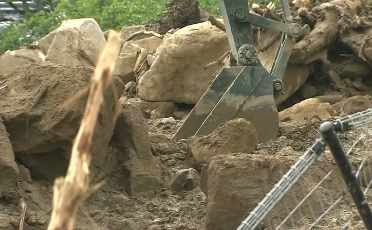
(Reuters) — Heavy rain delayed a search on Friday (August 22) for more than 50 people believed buried under a deadly landslide on the edge of the Japanese city of Hiroshima.
Rescue workers feared the continuing rain could set off further landslides in the area after a month’s rain fell in one night on Wednesday (August 20), loosening slopes already saturated by heavy rain over the past few weeks.
The death toll currently stands at 39. Earlier on Thursday (August 21) police reported only seven missing, but as more people reported relatives and friends missing, that number grew to 52 at the latest count – possibly more than doubling the death toll to 92.
“We have to be extremely careful here as we are looking at a potential secondary disaster due to weather conditions, so yes, we can say rescue and search operations are going through a difficult patch right now,” said Yasuo Toyota, deputy commander of the Japan Self Defense Ground Force 47th Infantry Regiment told local reporters as they dug through water-clogged mud.
Rescue workers, many with search dogs, feared the worst.
“It could be said in any disaster, but the extent of the damage here is bigger than we first through from the initial reports. Even looking at the disaster site, it’s still not possibly to fully grasp the full extent of the disaster, and as a result, the numbers of missing keeps increasing,” said Takeru Oka of the Japan Rescue Association.
Family and friends also came to see if they could locate some of the missing people, with some expressing hearing of the death of people they knew.
“Oh dear, they found Kota. That is so sad. Where did they find him?” said one unidentified neighbour to local broadcasters when told of the confirmation of the death of a 17-year-old high school student, Kota Torigoe.
Many residents found refuge at local schools where clothes and hot meals were being distributed to those who lost everything.
Even residents from nearby communities were arriving at the centres, fearing more landslides in the aftermath.
“Everyone got scared and even the people at the base of the mountain fled here,” said one evacuee at a local elementary school.
Cities in land-scarce Japan often expand into mountainous areas, with houses tucked just below steep slopes, leaving them vulnerable to landslides.







